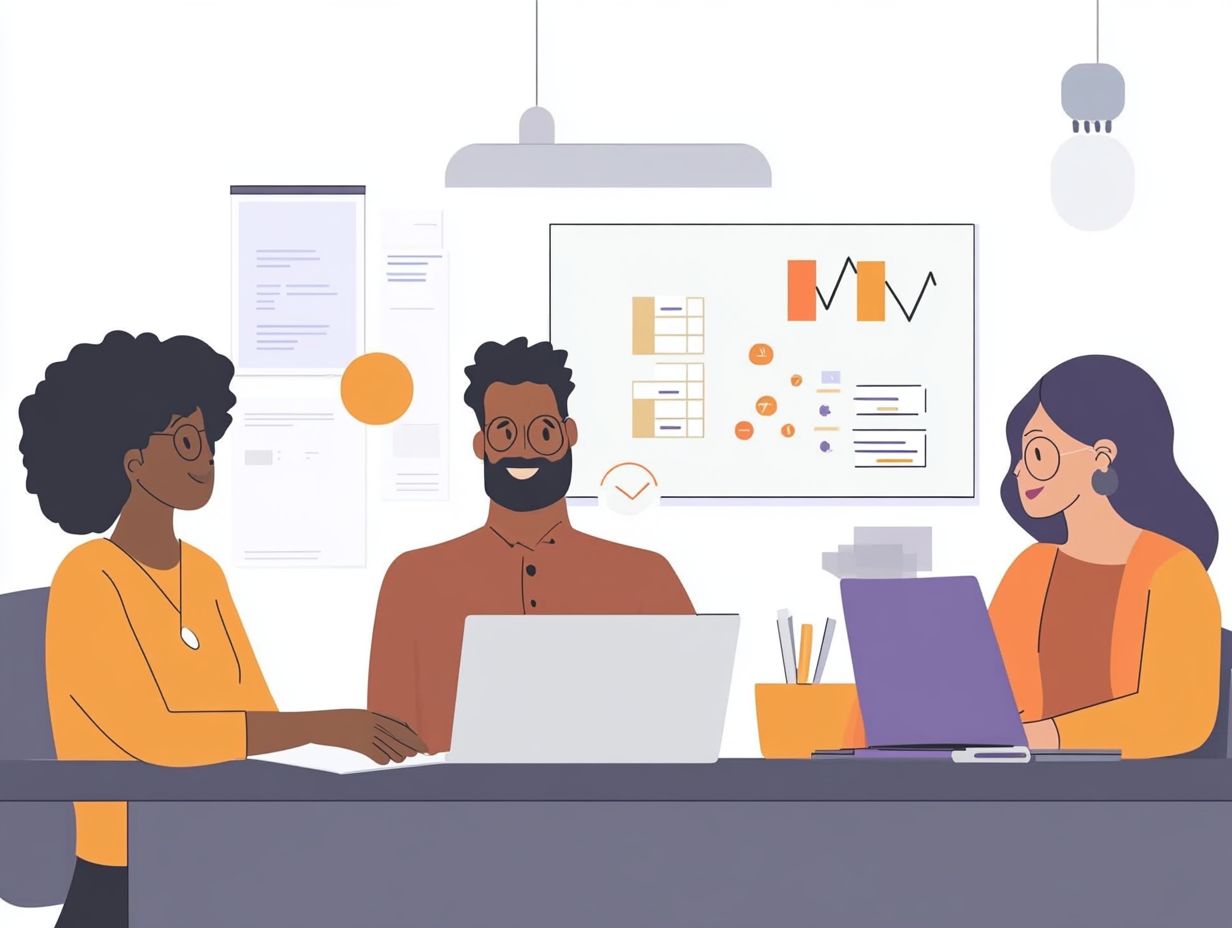Understanding Mortgage Types for New Buyers
Navigating the world of mortgages can feel overwhelming, especially for first-time homebuyers.
With options like fixed-rate, adjustable-rate, and government-backed mortgages, understanding what each type offers is essential. This article will guide you through the different types of mortgages to help you find the best fit for your financial needs.
You ll also learn about the mortgage application process and key terms, as well as what to expect during the closing and repayment phases.
Get ready to make informed choices as you dive into your exciting home-buying adventure!
Contents
Key Takeaways:

Understanding the different types of mortgages, such as fixed-rate, adjustable-rate, and government-backed options, is crucial for new homebuyers. When choosing a mortgage, consider factors like interest rates, loan terms, and your financial situation to find the best fit for your needs.
Familiarizing yourself with the mortgage application process, important terms, and repayment options can make your journey to homeownership smoother and less stressful.
What is a Mortgage and How Does it Work?
A mortgage is your ticket to buying real estate. It allows you to finance your dream home while using the property itself as collateral.
A lending institution, like a bank, provides you with money, and you agree to repay it with interest over a set period.
Carefully consider various loan types, including conventional loans and government-backed options. Your credit score and financial choices will influence these options.
Managing the mortgage landscape can feel daunting with so many choices, such as fixed-rate, adjustable-rate, and FHA loans. Each comes with unique benefits and eligibility criteria.
Understanding mortgage terms is vital. Focus on down payments and closing costs, as this knowledge helps you secure favorable terms and manage monthly payments effectively.
Your credit score plays a crucial role in determining interest rates and loan approval. It significantly affects your overall affordability and the long-term benefits of owning a home.
Types of Mortgages
Knowing the different types of mortgages is essential if you want to find the best financial solution for your real estate purchase.
Each mortgage type has unique advantages and disadvantages tailored to various financial situations.
Fixed-Rate Mortgages
Fixed-rate mortgages are a popular choice, offering the comfort of consistent monthly payments throughout the loan’s life. This feature is especially beneficial in unpredictable markets where interest rates can change.
This stability gives you the power to budget effectively without worrying about sudden increases in costs. Unlike adjustable-rate mortgages, which can change your payments, fixed-rate options keep your interest rate steady for the entire loan period.
As you navigate your home-buying journey, be aware of mortgage insurance requirements if your down payment is less than 20%. Understanding these details will help you compare fixed-rate mortgages with alternatives like ARMs or interest-only loans, each with its unique advantages and risks.
Adjustable-Rate Mortgages
Adjustable-rate mortgages (ARMs) offer the enticing prospect of lower initial monthly payments compared to fixed-rate loans. However, be mindful of the risk of rising interest rates that can significantly affect your long-term financial strategy.
These loans typically start with a fixed interest rate for a set period, often spanning from one to seven years. After that, your interest rate adjusts according to market conditions. This initial lower rate can be particularly appealing if you’re eager to minimize your upfront expenses, making homeownership more attainable.
As the economic landscape changes, you might face increased payments. This could create financial strain if your budget isn’t prepared for potential rate hikes. Understanding how these adjustments work is essential to evaluate your overall loan options and ensure that future payments remain manageable, even amid fluctuating economic circumstances.
Government-Backed Mortgages

Government-backed mortgages are designed for homebuyers who may find conventional loans out of reach. Options like FHA loans, VA loans, and USDA loans cater to distinct financial situations and housing needs.
Each loan type has its own requirements. FHA loans often attract first-time buyers due to lower down payment options. If you re a veteran or active military member, VA loans offer unique benefits, including the possibility of no down payment at all. On the other hand, USDA loans focus on rural homebuyers, promoting economic development in less-populated areas.
Recognizing that each option carries implications regarding mortgage insurance is crucial for overall affordability. Understanding the benefits and potential downsides of each loan type is vital for anyone navigating the dynamic housing market.
Choosing the Right Mortgage for You
Selecting the perfect mortgage is key to your financial success as a homebuyer. This choice can significantly influence your overall budget planning and long-term financial well-being.
It s vital to evaluate various loan options and credit requirements to make an informed decision.
Factors to Consider
When selecting a mortgage, consider several critical factors: the down payment amount, the portion of your income that goes towards paying debts, available interest rates, and the loan term that aligns with your financial goals.
Each element plays a pivotal role in shaping your financial landscape. For example, a higher down payment can lead to lower monthly payments and less overall interest paid throughout the loan’s life.
Your debt-to-income ratio is also essential; lenders typically favor ratios below 43%, indicating that a significant portion of your income isn t tied up in existing debts.
Interest rates fluctuate based on market conditions and your creditworthiness, directly impacting what you can afford. Choosing the right loan term whether 15 or 30 years not only affects the size of your monthly payments but also the total interest you ll pay. These factors intertwine to significantly influence your homebuying decisions.
The Mortgage Application Process
The mortgage application process is a pivotal moment as a homebuyer. Understanding the various stages, from pre-qualification to final approval, empowers you to navigate lending institutions with confidence.
This comprehension ensures that you meet the necessary criteria for loan eligibility, considering your credit scores and financial history.
Steps to Getting a Mortgage
Securing a mortgage involves several important steps. Start by assessing your finances and deciding on your down payment.
Next, interact with mortgage lenders and submit your application. Your credit score will influence your options.
Gather necessary documents like W-2s, tax returns, and bank statements to streamline your process.
Once you receive pre-approval, shop around for the best interest rates and terms.
Engaging with an experienced loan officer can provide valuable insights into different loan types. This ensures you make informed decisions.
Stay organized and communicate clearly with your lender for a smooth closing experience.
Understanding Mortgage Terms and Conditions

Grasping the terms and conditions of your mortgage is essential for making savvy financial decisions. This knowledge encompasses an array of loan types, interest rates, and repayment options that can profoundly impact your overall housing expenses and obligations.
By familiarizing yourself with these details, empower yourself to navigate your financial landscape with confidence and clarity.
Important Terms to Know
Familiarizing yourself with key mortgage terms is vital for navigating the home buying process. Concepts such as interest rate, loan term, mortgage insurance, and down payment hold significant weight in your overall financial commitment.
Understanding these terms directly affects how affordable a home is for you. For example, the interest rate dictates your monthly payments and impacts the overall cost of your loan; even a minor difference can translate to thousands of dollars saved or spent over the life of the loan.
The loan term, typically ranging from 15 to 30 years, influences both your monthly payment and the total interest you ll pay. A substantial down payment can help reduce monthly payments and eliminate the need for mortgage insurance, which protects lenders in case of default.
By grasping these definitions and their implications, you can make informed choices that align seamlessly with your financial goals.
Mortgage Closing and Repayment
The mortgage closing process is the final step in your journey toward homeownership. During this critical moment, all parties involved review the documents, agree on repayment options, and finalize the terms related to the loan and its associated products.
This step brings you closer to unlocking the door to your new home.
What to Expect at Closing
As you approach closing, be prepared to review and sign a multitude of documents, including the final mortgage agreement. Be aware of any fees or charges that may arise as you finalize your loan with mortgage lenders.
This stage is pivotal, marking the official transfer of property ownership from the seller to you, the buyer. Among the important documents you will encounter are:
- The loan estimate, which outlines the proposed terms,
- The closing disclosure, detailing the actual costs involved,
- A title report that confirms the property s legal status,
- A deed, which is crucial for proving your ownership.
There may be specific closing costs, such as origination fees and title insurance, that require your attention. It is highly advisable to conduct a final walkthrough of the property to ensure everything is in order before you put pen to paper.
Repayment Options and Strategies
Exploring repayment options is crucial for homebuyers. Understanding various mortgage products empowers you to make informed decisions about monthly payments and loan terms.
Different mortgage types like fixed-rate, adjustable-rate, or interest-only loans help you evaluate how these choices align with your financial goals. Each option affects not just your immediate affordability but also your long-term net worth.
Choosing a shorter loan term means higher monthly payments. However, it can save you a lot of interest over time, boosting your financial stability.
On the flip side, understanding flexible payment plans allows you to blend your lifestyle needs with fiscal responsibility.
Frequently Asked Questions

What are the different types of mortgages available for new buyers?
New buyers can choose from several mortgage types: fixed-rate, adjustable-rate, government-insured, and interest-only loans. Each type has unique terms, so understanding the home buying process for new buyers is vital before deciding.
What is a fixed-rate mortgage?
A fixed-rate mortgage keeps the interest rate the same through the loan term. This stability helps you budget for home expenses easily.
What is an adjustable-rate mortgage?
An adjustable-rate mortgage (ARM) has an interest rate that may change periodically based on market conditions. As a result, your monthly payments can go up or down depending on current rates.
What is a government-insured mortgage?
A government-insured mortgage is backed by the government, which protects lenders against losses in case of default. Examples include FHA and VA loans.
What is an interest-only mortgage?
This mortgage allows the borrower to pay only the interest for a set period, usually 5-10 years. After that, both principal and interest payments begin, potentially leading to higher monthly costs.
How do I know which type of mortgage is right for me?
To find the right mortgage, research and consult with a trusted lender. Consider your financial goals, budget, and future plans when making this choice.






